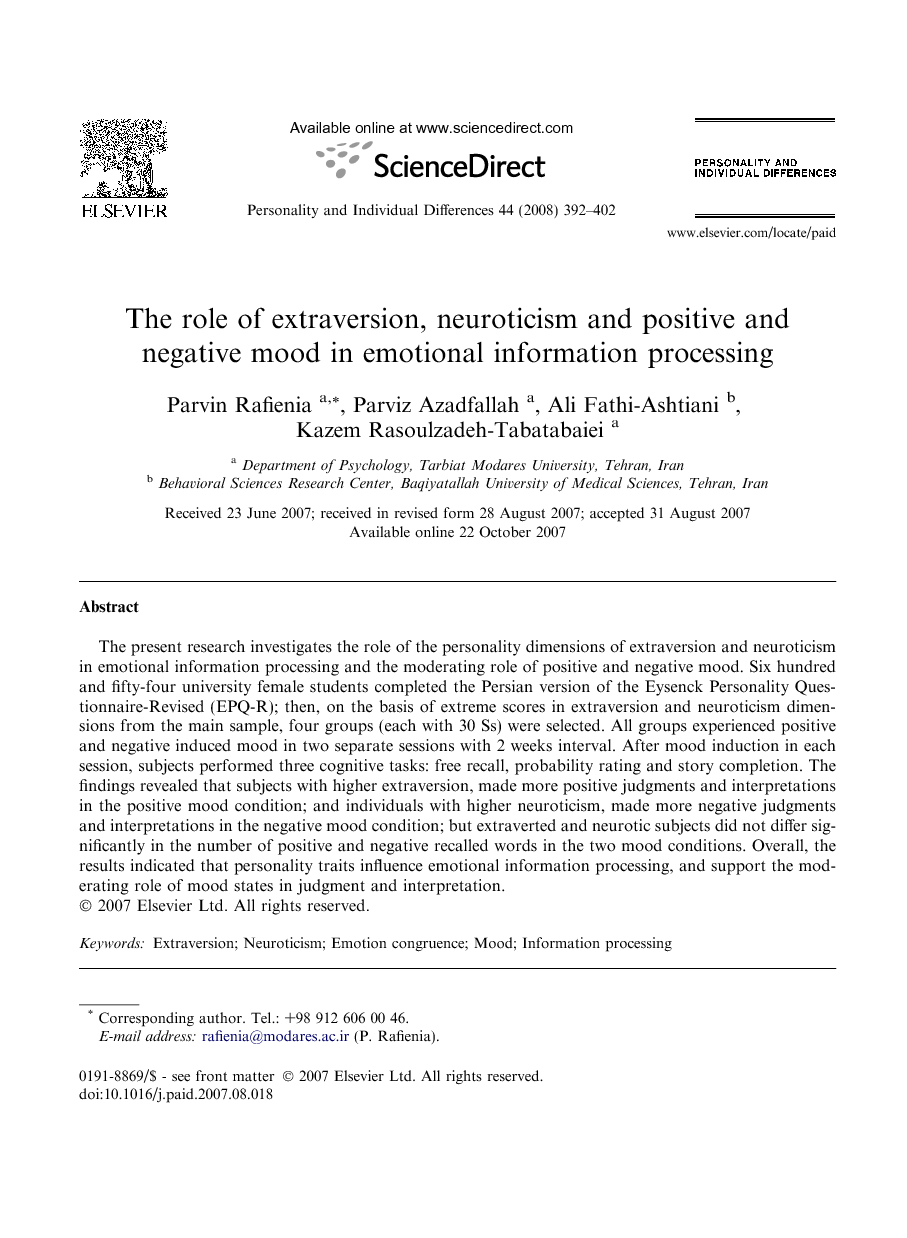Several studies found that while extraversion (E) correlates strongly with positive affect, neuroticism (N) correlates strongly with negative affect (e.g., Costa and McCrae, 1980, Gomez et al., 2000, Larsen and Ketelaar, 1989, Larsen and Ketelaar, 1991 and Robinson et al., 2007). Gray, 1970, Gray, 1981 and Gray, 1987 offers an explanation for emotional susceptibility in extraverts and neurotics. Based on Gray’s theory, E and N represent individual differences in the relative strengths of the behavioral activation system (BAS) and the behavioral inhibition system (BIS), respectively. Gray suggested that the anxiety component of N represents an increased sensitivity to punishment signals and the impulsivity component of E represents an increased sensitivity to reward signals (Rusting, 1999). A number of researchers (e.g., Larsen and Ketelaar, 1989 and Larsen and Ketelaar, 1991) have noted that individual differences in susceptibility to positive and negative affect could be the result of underlying individual differences in sensitivity to signals of reward and punishment. These sensitivities suggest that E and N might also relate to cognitive processing of positive and negative emotional information. Extraverted individuals should retrieve rewarding or positive information from memory (and make positive judgments), and neurotic individuals should retrieve punishing or negative information from memory (and make negative judgments) (Rusting, 1999).
A number of studies have found that processing of emotional stimuli is associated with both current mood and stable personality traits (e.g., Rusting, 1999 and Zeleneski and Larsen, 2002). This raises the possibility that personality traits associated with mood states are useful predictors of selective processing of emotional information (Gomez, Gomez, & Cooper, 2002). According to Mood congruency hypothesis ( Bower, 1981 and Bower, 1991), current mood states influence memory, judgment and other cognitive processing in an emotion-congruent manner; positive mood states should increase the tendency to make positive judgments and retrieve positive memories; negative mood states should increase the tendency to make negative judgments and retrieve negative memories. Some studies have obtained evidence supporting the mood congruent processing (e.g., Barber, 2001, Forgas, 1990, Isen et al., 1978, Mayer et al., 1992 and Mayer et al., 1995). However, some researches have not found the mood congruent effects (e.g., Gayle, 1997 and Parrot and Sabini, 1990).
Trait congruency hypothesis ( Rusting, 1998) suggests that people preferentially process emotional stimuli that are congruent in emotional tone with their personality traits. A number of studies have obtained results consistent with this hypothesis (e.g., Bradley and Mogg, 1994, Gomez et al., 2002 and Rusting and Larsen, 1998). Many of the previous studies that have examined the effects of mood states or personality traits on emotion-congruent processing, have been guided by associative network theories, such as, Bower, 1981 and Bower, 1991. According to this theory, each specific emotion is represented by a particular emotion node within a cognitive network consisting of emotion related memories and cognitions. When an emotion is experienced, the corresponding emotion node is activated and past events and beliefs associated with that emotion are brought to mind. This theory suggests that a specific-emotion node by a related emotion evokes emotion-related attention, perception, memory, interpretation and judgment.
Just as previous research shows, most studies have only examined one of these variables (mood states or personality traits). Although, some researchers have examined the interactive effects of moods and traits on cognitive processing (e.g., Bradley and Mogg, 1994, Jansson and Lundh, 2006, Rusting, 1999, Taimer and Robinson, 2004 and Zeleneski and Larsen, 2002), the results are not consistent. These inconsistencies may be related to participants, tasks or mood (natural versus induced) characteristics (Blaney, 1986, Forgas, 1994, Rusting, 1998 and Rusting, 1999); many of these studies have focused on natural mood or they conducted their study on pathologic samples (e.g., Denny and Hunt, 1992 and Fullam and Dolan, 2006). Thus, the role of manipulated mood states in relation to personality-cognitive processing in normal individuals has not been investigated properly.
So in the present study, the role of personality traits on processing (judgment, recall and interpretation) of positive and negative emotional information and the moderating role of positive and negative induced mood states were examined. It is speculated that the effects of personality traits on the processing of emotional information in positive mood state as compared with negative mood state would be different. In other words, especially it is expected that extraverted individuals process more positive emotional information in positive mood states than in negative mood states, and neurotic individuals process more negative emotional information in negative mood states than in positive mood states.


